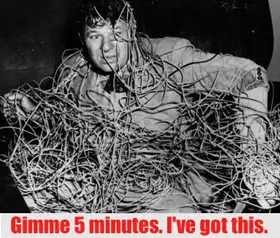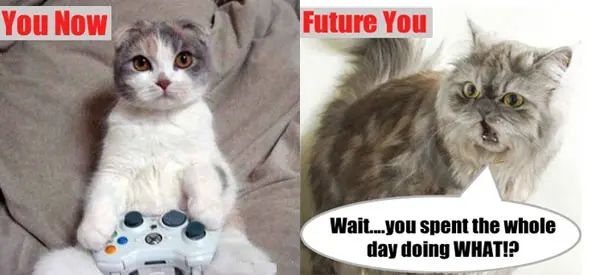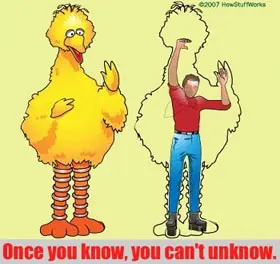When we sit at the keyboard, we rely on our brains to help us fill that vast white space with intriguing words, well-rounded characters, and watertight plot twists. Sometimes our brains oblige. But more often, our grey matter tells us that we should check Twitter (because what if our blog post got a retweet from someone important?), that we totally have time to catch up on TV while we eat lunch (because that’s just smart multitasking right there!), or that we should quit this writing nonsense and get a real job (because we suck anyway). Everything happens for a reason. Sometimes the reason is that your brain hates your guts. That’s just science.
Psychologists have identified all sorts of cognitive biases and mental tomfoolery that turn your mind against you every day. You can’t fix them all, but you can be aware of them, and in the illustrious words of G.I. Joe: Knowing is half the battle (the other half is severing limbs with a machete, but that’s a post for another day).
Escalation of Commitment
Your brain says: “You’ve put so much time and effort into writing this story, it’d be crazy not to finish.”
The reality: No matter how much you’ve invested in a project, sometimes it’s smarter to cut your losses. Kenny Rogers put it best: “You got to know when to hold ’em, know when to fold ’em, know when to walk away, and know when to run.”
 Imagine you’re an eccentric millionaire—probably wearing a monocle—who has spent two years and close to $100,000 creating a desk featuring cool-water sprinklers for those working in hot climes. You are just $20,000 and six months from finishing your prototype when IKEA launches a sprinkler desk. It’s just as good as yours, much cheaper, and comes in a handy flat-pack box. They’re probably calling it Sprynklerd or something with an umlaut. Do you spend the $20,000 and six months to finish your prototype?
Imagine you’re an eccentric millionaire—probably wearing a monocle—who has spent two years and close to $100,000 creating a desk featuring cool-water sprinklers for those working in hot climes. You are just $20,000 and six months from finishing your prototype when IKEA launches a sprinkler desk. It’s just as good as yours, much cheaper, and comes in a handy flat-pack box. They’re probably calling it Sprynklerd or something with an umlaut. Do you spend the $20,000 and six months to finish your prototype?
You may have said no because you are not an eccentric desk-building millionaire, so you can look at the situation from an outsider’s perspective and make a rational, fact-based decision. Why throw good money after bad? If a failing project has taken up years of your life, why give it even more of your time? Our brains are great at giving good advice to other people. This is the case with almost all the cognitive biases we’ll discuss here. Your brain isn’t out to screw everybody, just you.
When the situation is more relatable, Escalation of Commitment kicks in. Try this scenario: You’ve been writing a novel for eight months. You’re 75,000 words in when you realize that it’s not working. Really not working. There are plot holes everywhere, your characters are flat, and you’ve lost your passion for the story. Throw it out or keep writing? The truth is, you’d probably keep going. The more we have invested in a project—the sunk costs—the harder it becomes to walk away. Even when it would be logical to do so. Even when everyone else can see that we should call it quits.
Solutions:
- When you’re questioning the merit of a project, focus on what you have left to do instead of what you’ve already done. What will finishing the project cost you in time, happiness, energy, money, etc.? Is it worth it?
- Recognize that the resources you put toward one goal take resources away from other goals. Making more time for writing means less time with friends, working on other projects, and taking Instagram photos of your food. Are you okay with that? Decide which goals are truly important to you and prioritize accordingly.
- If you decide to walk away from a project, do it with confidence. Don't second-guess the choice or guilt yourself into a vat of Ben & Jerry's. Focus on what you gained from moving on, not what you lost.
- Replace the abandoned project with one that you feel more confident about.
Planning Fallacy
Your brain says: “Relax, you’ve got plenty of time for this project.”
The reality: You are straight-up terrible at estimating how long it will take you to finish tasks. You’ll almost assuredly underestimate the time you’ll need.
 When they started building the Sydney Opera House, the blokes in charge were all like, “No worries, mate. She’ll be done by 1963 and this $7 million budget should cover things nicely. Throw another shrimp on the barbie.” (Note: I am paraphrasing here.) Then they proceeded to tear through the $7 million faster than a kangaroo chasing a boomerang (fun with stereotypes!). The iconic building finally opened in 1973—ten years late and $95 million over budget.
When they started building the Sydney Opera House, the blokes in charge were all like, “No worries, mate. She’ll be done by 1963 and this $7 million budget should cover things nicely. Throw another shrimp on the barbie.” (Note: I am paraphrasing here.) Then they proceeded to tear through the $7 million faster than a kangaroo chasing a boomerang (fun with stereotypes!). The iconic building finally opened in 1973—ten years late and $95 million over budget.
The same thing happens to you on a (hopefully) much smaller scale when you write. You tend to underestimate how much time projects will take for you to complete. It’s called Planning Fallacy, and it’s why Afternoon-You looks at the to-do list made by Morning-You and says, “Were you under the impression that I am some sort of goddamn superhero or what?”
Psychologists think your overly optimistic planning is caused by a combination of wishful thinking and how you view similar projects you’ve done in the past, which is to say you subconsciously take credit for the progress that was made but blame outside forces for delays. The last article took so long to write because your computer crashed, your neighbor was playing “Rhythm Is A Dancer” on his damned guitar again, and you got stuck in traffic on the way to an interview. Those things weren’t your fault and won’t happen again, you say. But they might. And if they don’t, other time-sucks will show up to take their place.
Solutions:
- Your brain isn’t as bad at determining how long it will take someone else to complete a task. You’ll overestimate in most cases, but it’s nothing compared to the wildly overoptimistic standards you’ll set for yourself. When you need to determine a time frame for a project, imagine someone else will be completing the task and your guess will be closer to the truth.
- Planning Fallacy is going to tell you that writing your book will take, oh, maybe two weeks if you stop for meals. As always, it lies. For a goal as complex as that, the only way to get a remotely accurate estimate is to break it into the individual steps it will take to achieve it. Besides, it's scary as hell to see "write novel" on today's to-do list, but breaking it down into steps like "research alpaca breeding standards for book" or "write chapter seven" turns it into something that's finite, specific, and easier to wrap your head around. Make a list. Write down how long each step will take. Add ’em up.
- Make a note of how long similar tasks have taken, but don’t adjust for distractions or problems caused by outside sources.
- Identify potential snags. Assume they’ll happen.
Hyperbolic Discounting
Your brain says: “Watching that video of a baby otter eating a medley of seafood with his little paws is a great use of your time.”
The reality: Your brain favors immediate rewards over long-term ones, so it tries to trick you.

Here’s the trippiest thing you’ve heard all day: There is more than one You, and they want different things. NowYou wants the immediate gratification of baby otter videos and afternoons at the park. FutureYou has a jetpack and wants NowYou to get crackin’ on that book so FutureYou can go on a jetpack-powered book tour and look all impressive to your skeptical parents. Mind blown? Just remember: Every time NowYou decides to reorganize your book collection by color instead of working, FutureYou wants to punch you in the face. You’d better hope nobody ever figures out how to time travel.
This phenomenon is called Hyperbolic Discounting: the tendency to prefer smaller rewards now over larger rewards later. Humans may have been hardwired this way since the caveman days, when they had to immediately consume the food they gathered to avoid spoilage and hungry animals. We are way less likely to get attacked by pterodactyls in 2012, but we are still plagued by fat guys who refuse to stop eating donuts now to avoid heart attacks later and idiots with YOLO tattoos. And more importantly, we still procrastinate when we should be writing.
Solutions:
- Fool your brain by providing short-term rewards for completing parts of your long-term goals. Finish a chapter of your novel? Go eat frogurt, head to the pub, or do bath salts…whatever is rewarding for you.
- Force NowYou to write a note to FutureYou every time you goof off. Explain yourself, dammit. Wait two weeks then read the lame excuses offered up by PastYou. Repeat until you’re furious enough to straighten up or invent a time machine.
Curse Of Knowledge
Your brain says: “Readers are going to understand everything in your story.”
The reality: Once you know something, it’s tough to remember what it was like not to know it.
 Try this: Wander over to your office mate, captor, or barista and explain that you are going to knock on your desk to the rhythm of a song. It’s their job to guess the song. Use “Don’t Stop Believing,” “Thriller,” or some other well-known song of your choosing. What do you think the odds are they will be able to identify the song? Try and report back…
Try this: Wander over to your office mate, captor, or barista and explain that you are going to knock on your desk to the rhythm of a song. It’s their job to guess the song. Use “Don’t Stop Believing,” “Thriller,” or some other well-known song of your choosing. What do you think the odds are they will be able to identify the song? Try and report back…
They didn’t get it, did they? And you were sure they would. When this experiment was run in a more formal setting, only 3 out of 120 songs were guessed correctly, and the tappers were shocked. The song was playing so clearly in their heads that they couldn’t imagine anyone missing it. That’s the Curse Of Knowledge (cue lightning and maniacal laughter).
As writers, it’s a cognitive bias worth watching for. Just because you recognize a reference, find something entertaining, or understand something about your plot or character, does not mean your reader will. If you’ve got an outline of your novel and knowledge of future events, it’s easy to inadvertently write scenes that confuse readers who don’t know as much about your story. The story in your head sounds like “Thriller,” but to your readers, it sounds like random tapping. Try to avoid that.
Solutions:
- Get a good editor or smart reader to give you honest feedback. When I started my novel, I had a giant Curse-Of-Knowledge-induced blind spot in early chapters. Fortunately, I was taking Christopher Bram’s novel-writing course here on LitReactor, and he pointed it out.
- Make sure the test reader isn’t privy to the inner workings of your story. Another classmate, who had read my outline, noted that “Chris is right, but having read your synopsis, my mind just filled that information in for me and I never noticed it was missing.”
Dunning-Kruger Effect
Your brain says: “You’re a pretty awful writer. Why are you still doing this?”
The reality: If you were truly terrible, you probably wouldn’t know it.
You know those first episodes of American Idol where tone-deaf contestants shriek over Katy Perry backing tracks then look truly shocked when the judges don’t see their talent? Those deluded souls are victims of the Dunning-Kruger Effect, which says that incompetent people lack the skill to recognize whether or not they are competent. In other words, truly terrible writers don’t know enough about good writing to see a difference in writing quality between Fifty Shades and Moby Dick. (They may also need to be told that Moby Dick is not a porn involving a bald vegan musician, but that’s a different problem altogether.)

You, on the other hand, are a tormented hub of self-doubt, constantly wondering whether you should put away this crazy writing dream and get a real job. Because you suck. So much. In other words, you’re a typical writer. Take comfort in the fact that if you were actually useless, you’d be clearing a space on the mantle for your Pulitzer.
Solutions:
- Pay attention to critiques from workshops, readers, editors, agents, window washers, and anybody else willing to give you honest feedback. Use the constructive bits to improve and ditch the rest.
- Set goals designed to help you become a better writer instead of goals to prove you’re already the best. Let yourself make mistakes. One more time: Let. Yourself. Make. Mistakes.
-
Most importantly, if you love to write, then write. To hell with whether you’re the next Faulkner or Dickinson.
Do any of these cognitive biases affect your writing practice? Which ones are the biggest pests?

About the author
Kimberly Turner is an internet entrepreneur, DJ, editor, beekeeper, linguist, traveler, and writer. This either makes her exceptionally well-rounded or slightly crazy; it’s hard to say which. She spent a decade as a journalist and magazine editor in Australia and the U.S. and is now working (very, very slowly) on her first novel. She holds a B.A. in Creative Writing and an M.A. in Applied Linguistics and lives in Atlanta, Georgia, with her husband, two cats, ten fish, and roughly 60,000 bees.








